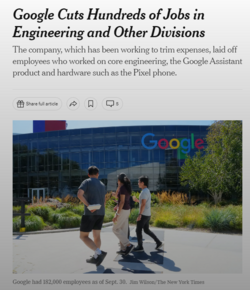
For much of the 21st century, software engineering has been seen as one of the safest havens in the tenuous and ever-changing American job market.
But there are a growing number of signs that the field is starting to become a little less secure and comfortable, due to an industry-wide downturn and the looming threat of artificial intelligence that is spurring growing competition for software jobs.
“The amount of competition is insane,” said Joe Forzano, an unemployed software engineer who has worked at the mental health startup Alma and private equity giant Blackstone.
Has AI affected your job? We want to hear from you. From a non-work device, contact our reporter at maxwell.strachan@vice.com or via Signal at 310-614-3752 for extra security.
Since he lost his job in March, Forzano has applied to over 250 jobs. In six cases, he went through the “full interview gauntlet,” which included between six and eight interviews each, before learning he had been passed over. “It has been very, very rough,” he told Motherboard.
Forzano is not alone in his pessimism, according to a December survey of 9,338 software engineers performed on behalf of Motherboard by Blind, an online anonymous platform for verified employees. In the poll, nearly nine in 10 surveyed software engineers said it is more difficult to get a job now than it was before the pandemic, with 66 percent saying it was “much harder.”
Nearly 80 percent of respondents said the job market has even become more competitive over the last year. Only 6 percent of the software engineers were “extremely confident” they could find another job with the same total compensation if they lost their job today while 32 percent said they were “not at all confident.”
Over 2022 and 2023, the tech sector incurred more than 400,000 layoffs, according to the tracking site Layoffs.fyi. But up until recently, it seemed software engineers were more often spared compared to their co-workers in non-technical fields. One analysis found tech companies cut their recruiting teams by 50 percent, compared to only 10 percent of their engineering departments. At Salesforce, engineers were four times less likely to lose their jobs than those in marketing and sales, which Bloomberg has said is a trend replicated at other tech companies such as Dell and Zoom.
But signs of dread among software engineers have started to become more common online. In December, one Amazon employee wrote a long post on the anonymous employee platform Blind saying that the “job market is terrible” and that he was struggling to get interviews of any sort.
The situation is a stark shift from much of the past two decades, when computer science degrees and coding bootcamps exploded in popularity due to the financial security they both promised. Entry-level Google software engineers reportedly earned almost $200,000 a year and lived a life full of splashy perks, and engineers always seemed in high demand, meaning the next job was never hard to find.
As an undergraduate at the University of Pennsylvania in the early 2010s, Forzano had decided to major in computer science. The degree had put him in $180,000 of debt, but he saw it as a calculated bet on a sturdy field of work. “The whole concept was [that] it was a good investment to have that ‘Ivy League degree’ in an engineering field,” he said. He thought he’d be set for life.
Early in his career, that seemed to be true. Recruiters spammed him with opportunities, and he was easily able to jump from job to job and became a manager. The field felt so secure that the phrase “learn to code” became a mocking rejoinder whenever people in other fields expressed concern about their own job prospects online.
But the messages from recruiters have largely dried up since the pandemic, and getting the sort of jobs software engineers took for granted has become much harder. “There's just so much fucking competition,” he said. “It's a completely different landscape.” Thinking back to his decision to major in computer science as an undergraduate, he said he now feels “very naive.”
With the entrance of artificial intelligence into the conversation recently, there have been signs of a sea change in the coding world. AI programs that allow users to write code using natural language or auto-complete code were among the first wave of AI tools to take off. Google CEO Sundar Pichai said last year that AI-powered coding tools had reduced the time it takes workers to complete code by 6 percent.
“In the age of AI, computer science is no longer the safe major,” Kelli María Korducki wrote in The Atlantic in September. Matt Welsh, an entrepreneur who used to serve as a computer science professor at Harvard, told the magazine that the ability of AI to perform software engineering functions could lead to less job security and lower compensation for all but the very best in the software trade.
As of December, software engineers were not expressing much concern about AI making their jobs redundant. Only 28 percent saying they were “very” or “slightly” concerned in the Blind poll, and 72 percent saying they were “not really” or “not at all” concerned.
But when not considering their own situation, the software engineering world’s views on AI became markedly less optimistic. More than 60 percent of those surveyed said they believed their company would hire fewer people because of AI moving forward.
Forzano has not been shy about his trouble, sharing his pursuit for a new job on social media. The decision has led him to feel less alone, he said, as other tech workers expressed similar frustration about not being able to get interviews for jobs they felt overqualified for.
“We're all kind of like, ‘What the fuck is happening?’” he said.
Techbros... we got too cocky...

On a more serious note, it's not that AI will sweep in and "took are jeeeerbs", the whole market is readjusting and with it, there will be lots of losses in the process. Just be sure to have an exit plan, no matter what.
Last edited by a moderator: